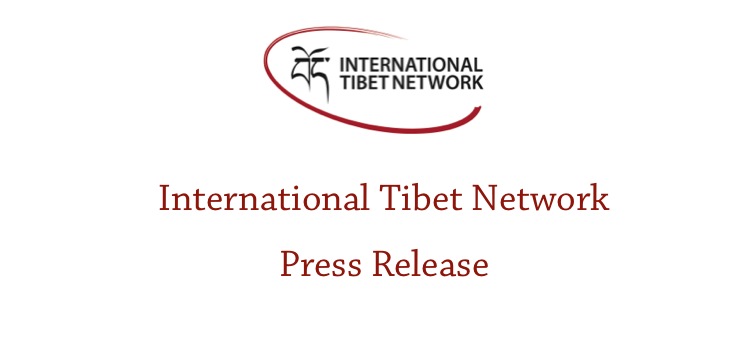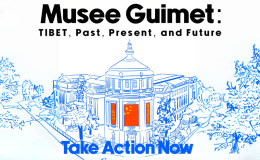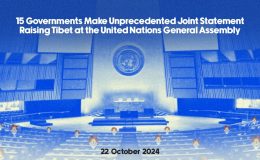Press Release: 19 July 2011
For further information:
Dhardon Sharling (English/Tibetan, India) +91 941 879 1189
Tenzin Dorjee (English/Tibetan, USA) + 1 646 724 0748
Tenzin Jigme (English/Tibetan, USA) + 1 703 424 0015
Alison Reynolds (English, UK) + 44 7711 843 884
To view the Press Conference https://www.tibetnetwork.org/press-conference.
Tibet campaigners from the International Tibet Network and Member groups Tibetan Women’s Association and Students for a Free Tibet today held an online press conference to condemn China’s current propaganda drive and crackdown in Tibet. We believe this to be the first press conference using Google+ (1)
Tibet campaigners have spoken out about China’s Vice President Xi Jinping’s visit to Lhasa (1) for events to mark the 60th Anniversary of the signing of the 17 Point Agreement of 1951 – what China calls the “peaceful liberation” of Tibet (2). China has sealed off the Tibetan Autonomous Region (TAR) to foreign tourists since June and placed Lhasa under maximum security. Since arriving in Tibet, Xi has opened a new highway, visited Tibet University, a special exhibition and senior Tibetan leaders. Meanwhile protests continue to flare in Kham and Amdo, and a rare protest took place in Lhasa last month (3).
“China’s so-called “peaceful liberation” propaganda campaign is to be condemned, based as it is on a gross distortion of history” said Alison Reynolds of the International Tibet Network, a global coalition of Tibet-related campaign organisations (4). “Organised events in Lhasa, taking place in a tense city under lockdown, will be totally unrepresentative of the true situation in Tibet, with Tibetans most likely coerced into attending. If Xi Jinping wants his visit to Tibet to really mean something,” added Ms Reynolds, “he should depart from the script, apologise for the misery the People’s Liberation Army and Chinese Communist Party have inflicted upon Tibet, and pledge to genuinely engage with the exiled Tibetan leadership.”
“As Xi Jinping joins China’s celebrations of 60 years of rule in Tibet, one can’t help but notice the irony in celebrating a host of failures,” said Tenzin Dorjee of Students for a Free Tibet. “China has not only failed to assimilate Tibet, it has also failed to intimidate the Tibetans into silence. Tibetans routinely get imprisoned, tortured, or worse for expressing their faith in the Dalai Lama, or their desire for self-determination, or their opinions about China’s failed policies. But in spite of all these restrictions, Tibetans continue to engage in street protests that demand freedom for Tibet.”
Dhardon Sharling of the Tibetan Women’s Association said, “What 60 years of China’s rule in Tibet means is 60 years of failed policies in Tibet (4). The arrogance of China’s Communist Party and its stranglehold on Tibet for 60 long years is an affront to justice and to the international condemnation of Chinese rule in Tibet. The CCP is 90 years old – it is time for it to retire and bring to an end the 60 years of long-standing injustices against Tibet and the Tibetan people.”
“While Xi Jinping participates in events in Lhasa, Tibetans from Kham and Amdo are being brutally repressed – a part of life in occupied Tibet that China is not showcasing in its propaganda events”, added Tenzin Jigme of the International Tibet Network. “The real showcase of Tibetan culture can be found in homes and monasteries across Tibet, where Tibetans continue to celebrate their national identity.”
Demands:
- We urge China to withdraw its paramilitary forces from Tibetan areas and unconditionally release all detainees.
- We call on our governments to issue public statements of concern about the situation in Tibet, especially in Ngaba and Kardze – although some governments have done this, not enough, and all governments need to continue to raise their concerns directly with China’s most senior leaders in the strongest diplomatic terms, and press for access to Tibet. We also encourage the media to press for access to all Tibetan areas.
- Xi Jinping, who is expected to succeed Hu Jintao next year, should seize this opportunity to try and understand the issues in TIbet. We call on Xi to genuinely engage with the exiled Tibetan government and allow the people of Tibet the freedom to determine their own future.
- We call on the upcoming 5th generation, including Xi Jinping, to radically review Tibet policy. The resistance and discontent that Tibetans continue to express demonstrate how China has failed to assimilate or silence Tibetans. The only solution is to allow Tibetans the right to determine their own future. As far as Tibet is concerned, China’s 4th generation are failed leaders.
Notes:
To view a video of the online press conference of 15 July see https://www.tibetnetwork.org/press-conference. For a full transcript see https://docs.google.com/document/d/1hxQDjIV7c8qyhkdn_If1Ma22xcVI1Q5EyBijNytRqEI/edit?hl=en_US
1. See http://news.xinhuanet.com/english2010/china/2011-07/17/c_13990781.htm. For a Tibet-related profile of Xi Jinping see www.chinese-leaders.org/xi-jinping/
2. The ’17 Point Agreement’ followed China’s invasion of Tibet in 1949/50. Signed on 23 May 1951 by the Chinese government and by the Tibetan government under duress, the ‘agreement’ collapsed under growing opposition to Chinese rule among Tibetans and the escape of the Dalai Lama in 1959.
3. For a statement from the worldwide Tibet movement on the situation in Ngaba, see https://www.tibetnetwork.org/campaigns-ngabastatement. See also the transcript of Alison Reynolds’ statement to the press conference for details of recent protests and detentions. https://docs.google.com/document/d/1hxQDjIV7c8qyhkdn_If1Ma22xcVI1Q5EyBij…
4. The International Tibet Network is a global coalition of Tibet related non-governmental organizations, which works to maximize the effectiveness of the worldwide Tibet movement. Network Member organizations hold varied positions on Tibet’s future political status, but all regard Tibet as an occupied country and are dedicated to ending human rights violations in Tibet, and to working actively to restore the Tibetan people’s right under international law to determine their own political, economic, social, religious, and cultural status.
5. For a report on 60 Years of China’s Failed Policies in Tibet see www.17pointsofdisagreement.org.





